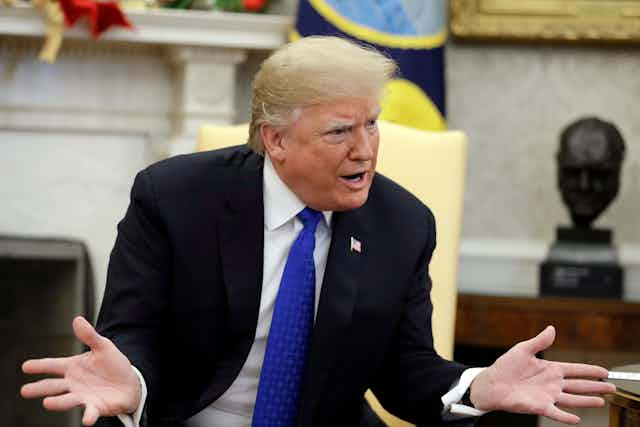As resistance to Donald Trump’s presidency continues to dominate American political life, it’s worth asking the question: what exactly is being resisted?
Answers can range from Trump’s reckless and erratic behaviour to his racist and xenophobic views and the outright corruption of his administration, to name just a few.
This means what people resist and also the way they resist can be varied, although outrage is often its dominant emotion.
Read more: Resistance is a long game
Despite the legitimate need for resistance, however, resisting Trump angrily feeds into his victim complex, strengthening his appeal to his base.
Given this reality, those resisting need to be aware of whether their acts of resistance offer real alternatives to Trumpism or rather play into the president’s hands by further amplifying anger and division.
To make resistance more effective, it is important to rediscover contemplative forms of activism. This type of activism has played a prominent role in the history of social change but has been less popular in the age of Trump.
Contemplative activism
What I mean here by “contemplative activism” are forms of social action that emphasize critical, first-person inquiry. In this way, our internal thoughts and emotions are linked to creating positive change in the outer world. Numerous examples exist in human history, such as Mohandas K. Gandhi’s civil disobedience campaign in the Indian independence struggle and Martin Luther King Jr.’s pacifist approach to civil rights.
In the same vein as Gandhi and King, a lesser-known figure in American contemplative activism is Thomas Merton. Merton, a Trappist monk, prolific writer and social justice advocate, involved himself wholeheartedly in the pressing issues of his time, including civil rights, the Vietnam War and nuclear proliferation.

So significant was Merton’s impact that Pope Francis, during his 2015 address to the U.S. Congress, mentioned Merton as a notable American and source of inspiration for many.
How might the work of Merton and other contemplative activists be relevant in the age of Trump? Specifically, Merton does not shy away from addressing our own individual complicity in the creation of the violence and despair around us.
Delving into the horrors of his own time in the essay “Is the world a problem?”, Merton writes:
“The world is …a complex of responsibilities and options made out of the loves, the hates, the fears, the joys, the hopes, the greed, the cruelty, the kindness, the faith, the trust, the suspicion of all. In the last analysis, if there is a stupid war in Vietnam because nobody trusts anybody, this is in part because I myself am defensive, suspicious, untrusting…”
In addition, the contemplative activism of Merton helps us more clearly see the underlying realities of complex social problems, such as the enduring persistence of fear and greed.
Trump is not an anomaly
This type of contemplative clarity can help us understand how Trump is not an anomaly in American history. While he may behave differently than many modern U.S. presidents, this difference is based more on style than substance.
For instance, Trump’s policies are largely within the Republican mainstream, and he represents some basic and ugly truths about American history (all which far predate him), whether it’s white rage and resentment, delusions about America’s greatness or the savage effects of inequality in a predatory capitalist system.

In essence, Trump represents the stereotypical “ugly American” that many U.S. citizens have played a role in creating. Trump unmasks the ugliness of the United States and lays it bare for all to see.
With this realization, Americans must reflect on what resistance means when the “enemy” is its own history and its own collective ugliness. Instead of seeing this situation as debilitating, it can be seen as liberating, as it frees people to resist and create alternatives to Trump in a less reactive way.
So while many of Trump’s policies need to be challenged and resisted, Trump is more a symbol and symptom of a larger dysfunction, rather than its root cause.
We are the problem and the solution
This month marks the 50th anniversary of Thomas Merton’s death. His call to fight injustice through a clear-eyed assessment of our collective social condition and critical self-examination is needed now more than ever.
It’s time to move beyond seeing Trump as the defining problem, by both contextualizing his place in the American social fabric and understanding how our actions can either alleviate or worsen toxic political climates in the United States and around the world.
Beyond resistance, it is more powerful to work for an inspiring vision of change. In the effort to defeat Trumpism and movements like it, we can be either part of the problem or the solution.

